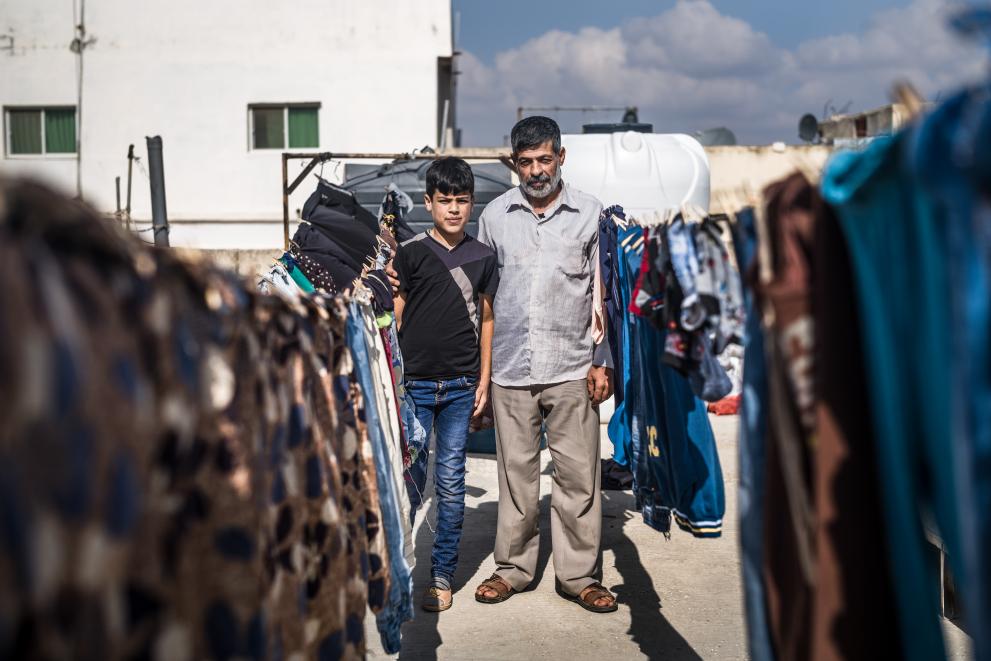The EU Regional Trust Fund in Response to the Syrian Crisis supports access to water and sanitation services through strengthened local capacities and improved infrastructures. Through this priority sector, the EU Regional Trust Fund currently provides for more than 400,000 vulnerable people in Lebanon, Turkey, Jordan, and Iraq.

Nader, 44, from Deraa, Syria, and Chaikha, 45, also from Syria are part of the cash-for-work component of a solid waste management project managed by a consortium of partners led by GIZ and supported by the European Union, via the EU Regional Trust Fund in Response to the Syrian Crisis. The aim of the project is to develop a more efficient solid waste management system and waste water treatment in Za’atari and Azraq camps. Watch their story and learn more about the work the European Union does in the region here: bit.ly/EUTFSyria
The European Union Regional Trust Fund in response to the Syrian crisis’ exhibition "Faces of Resilience: From Syria and the Region" by photographer Johanna de Tessières displays portraits and personal stories of those whose lives have been irrevocably impacted by the Syria crisis. Johanna’s photos document a selection of the many projects supported by the European Union through the Trust Fund. They shed light on the individual lives behind the unimaginable numbers, which have been irrevocably changed by the Syria crisis. These photos also showcase how the EU’s support has enabled many Syrians, Iraqis, Jordanian and Lebanese people to start rebuilding their lives and to turn desperation into hope. Despite trauma and personal losses, the protagonists of these stories reveal their extraordinary resilience and determination to carry on, care for their children and dream of a better future.
Water scarcity is a major concern in Lebanon, but thanks to the support of the European Union via the EU Trust Fund in response to the Syrian crisis, families like Maher’s have now access to water all year round. By building a system to collect and store rainwater, Lebanese and Syrian families can now save money and address other household needs.
Strict health regulations to ensure workers’ protection in Azraq camp
Khaled is a volunteer at World Vision’s ‘Solid Waste Management’ programme, implemented inside Azraq Refugee Camp.
The camp was put in lockdown following the COVID-19 outbreak and it became impossible for residents to go outside of the camp or to circulate freely within the camp. Like many, Khaled had to stop working for a while, because of the health situation, to keep himself and his family safe. However, he was able to resume his work as a volunteer thanks to the implementation of strict health guidelines.
“Due to COVID-19, it has become more difficult to shop for groceries in Azraq...

A safer and more efficient waste management system
"We can say that 97% of the people living in the camp cooperate, they are sorting their waste."
Nader, 44, is from Deraa, Syria, and has been living in Jordan for almost 9 years. He lives in Za’atari camp with his wife and children and works as a technical team leader for Oxfam. “I have different responsibilities […]: managing workers, overseeing them and make sure they are in charge of sorting [waste], and supervising all the machines and tools we have,” he explains.
Oxfam is...

When everyone has access to safe and clean water
Salim, 43, is from Irbid, Jordan and lives with his family of 6. Due to an illness, Salim can’t work so the National Aid Fund provides his family with monthly financial support, thanks to which schooling for their 4 children, and all other living expenses, including water and electricity, can be paid.
Because water is very scarce, its price can be pretty steep for families like Salim’s, who struggle to make ends meet. “We used to pay around 15 dinars a month to buy water in very small quantities. Now we pay that amount every 3 months,” he explains....

